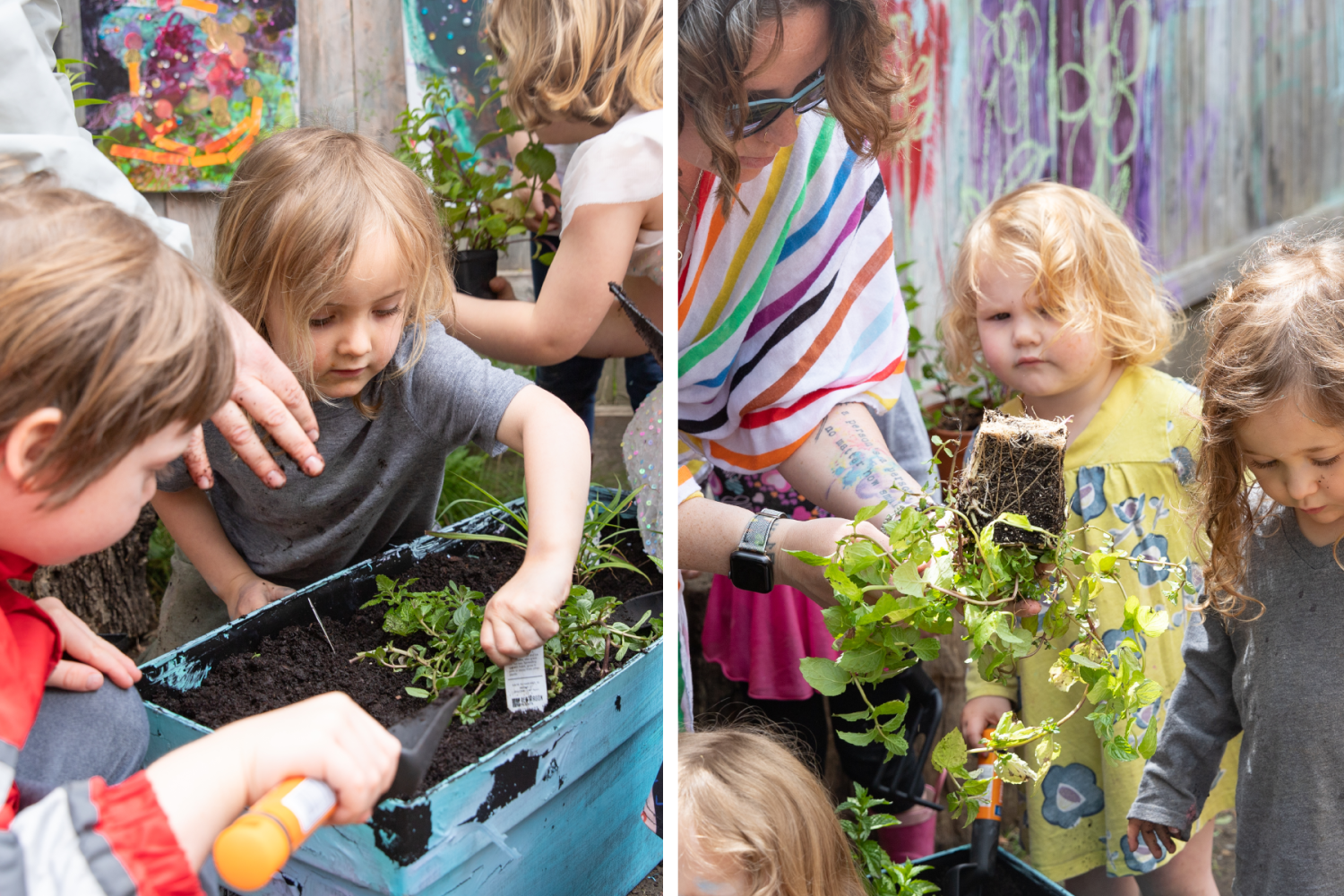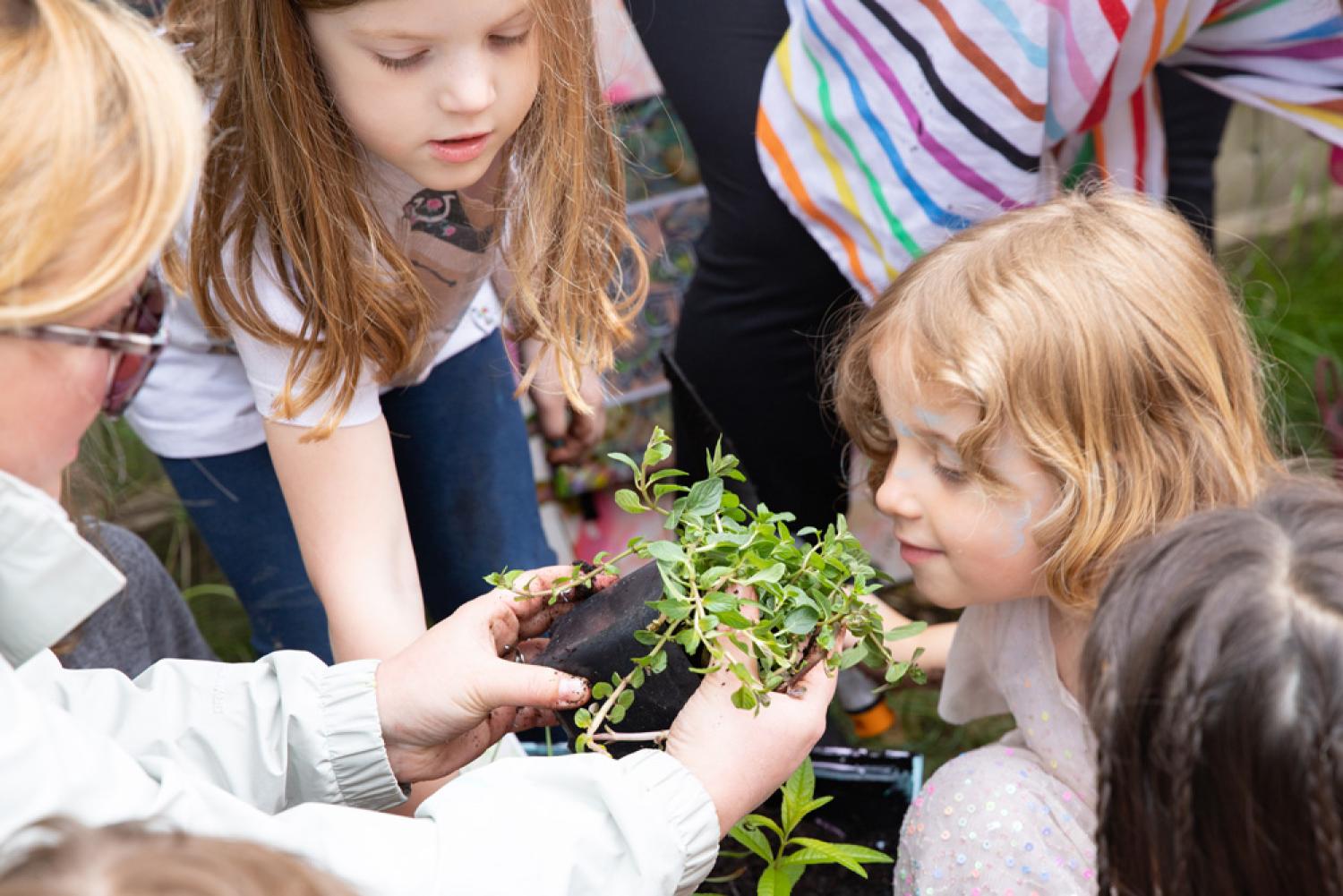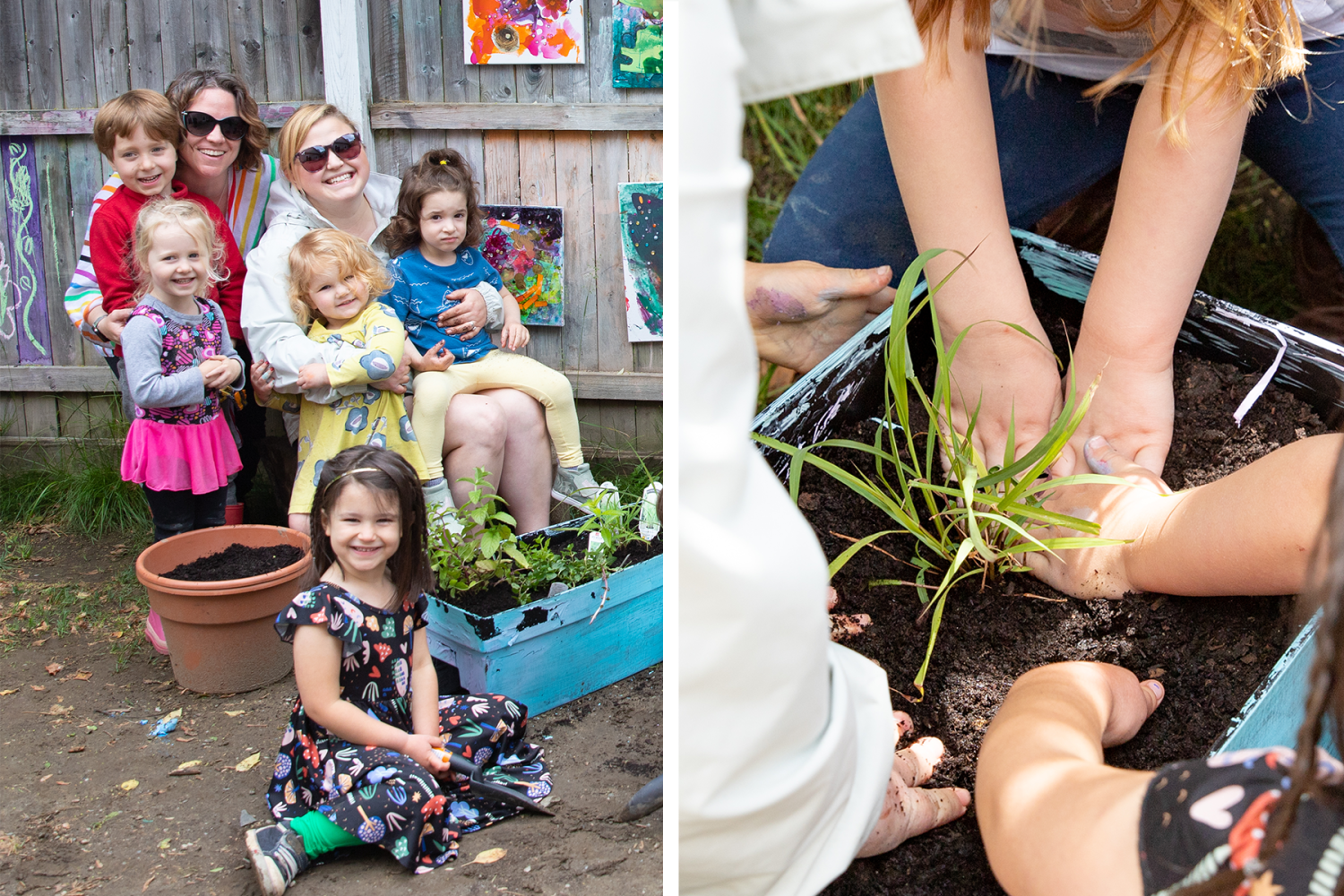Sharing the Harvest
And suddenly, there were hornworms. Lots of them! The children were growing tomatoes from seed for the first time and were excited to see three plants just starting to get a little bigger. But they also took seriously their responsibility to care for the earth, and that included the hornworms who were making short work of the tender plants.
The kids made a thoughtful decision: one of the tomato plants would be dedicated to the caterpillars, while the other two would be protected for their own harvest. With care and gentleness, the young gardeners kept relocating hornworms to their designated plant, giving both kids and caterpillars a chance at nourishment.

In this first year of growing, the teachers at Growing With Wonder were less concerned about the tomato harvest, and more focused on the experience of the process itself. School Director Dawn Irwin recounts, "When the kids were saying, 'they should have their own plant,' we thought, 'of course, they should have their own plant!' We really try to support the learning that the kids are interested in." In addition, Dawn explains, "The fact that they were curious about the caterpillars helps the teachers remember to be curious too, and not just think of them as something we need to deal with."
And while the caterpillars ate up their whole plant and killed it off, the kids succeeded in growing enough tomatoes for a delicious taste test!
Growing Wonderfully
Growing With Wonder is a unique early childhood center that embraces the Reggio Emilia pedagogy, placing emphasis on child-led, play-based learning experiences. The program hosts 20 children and is supported by a team of five teachers, ensuring a low student-teacher ratio and providing ample opportunity for personalized education. The center's philosophy is deeply rooted in nurturing students' social-emotional growth and empowering them to become responsible, compassionate citizens of the world.
True to its name, Growing With Wonder naturally incorporates food-growing activities into its educational approach. This aligns with their philosophy of fostering curiosity and hands-on learning. By engaging with the food cycle—from planting and harvesting to cooking, tasting, and composting—children deepen their understanding of life cycles and interconnectedness. Last year's tomato planting event marked the beginning of including gardening in the program, helping children develop a sense of responsibility for the earth and an appreciation for sustainable food practices.

Gardening has offered kids the opportunity to experience the joys of growing their own food and tackling challenges like the sudden arrival of hornworms. Through their curious and compassionate approach to this unexpected turn of events, the children practiced problem-solving, and developed resilience while actively engaging in the process of collective learning.
Growing with Wonder incorporates other food related activities, too—like taste-testing and composting—so the children can practice engaging with food in a meaningful and responsible way. By trying new foods, like the watermelon radish and teas made from garden herbs, students develop a sense of curiosity and open-mindedness. Composting teaches them about sustainability and the importance of reducing food waste, instilling a sense of environmental stewardship.
By providing hands-on experiences and fostering collaboration, inclusivity, and environmental stewardship, the school nurtures a generation of mindful, compassionate citizens who will carry these values into the future.

By connecting young children with fresh, locally sourced food, farm to early childhood programs are not only supporting their health and development, but also creating ripple effects that benefit communities and the environment.
Benefits to Centers
- Creating a culture of health and wellness by integrating whole and nutritious foods.
- Connecting young children with farmers so they understand where their food comes from, which can help them develop the skills and attitudes that foster nutritious eating habits.
- Infusing outdoor learning opportunities into existing curriculum and family engagement activities.
- Fostering stronger relationships with parents, neighbors and community partners.
- Enhancing program quality by meeting multiple learning and programmatic standards through alignment with child care licensing regulations, Vermont Early Learning Standards, and CQI systems like STARS.
Benefits to the Environment
- Developing children’s understanding of the Big Ideas of Sustainability at a young age through experiences that foster respect, responsibility, and reflection. Read more in Shelburne Farms’ Cultivating Joy & Wonder.
- Cultivating child, staff, and family preferences for nutritious foods grown in sustainable and just food systems.
- Contributing to nutrient-rich soil and soil regeneration through compost education, promoting sustainable food production, and investigating interconnected habitats.
- Farm to early childhood and farm to school programs optimize food purchasing and use to reduce food waste and can teach composting and recycling habits to minimize environmental impact.
Talk to Dawn, or Centers Like Hers
- Connect with Growing With Wonder Director Dawn Irwin: [email protected]
- Connect with the Vermont Farm to Early Childhood Coalition via Shelburne Farms Farm to Early Childhood Partnership Manager Cynthia Greene: [email protected]
Connect to Organizations
- Vermont Farm to School & Early Childhood Network: networking information, regional partner organizations, resources, and updates on Vermont’s efforts to promote farm to school and early childhood initiatives statewide.
- Northeast Organic Farming Association of Vermont: find and connect with producers
- National Farm to School Network Resources: a sortable database of resources
Apply for Professional Learning Programs & Grants
- Northeast Farm to School Institute: Vermont FEED’s unique year-long professional learning opportunity for selected school, district, or early childhood teams from New England and New York.
- Vermont Agency of Agriculture Food and Markets’ Farm to School and Early Childhood Grants Program: financial and technical assistance to schools or early childhood education organizations looking to develop or expand their farm to school programs.
- KidsGardening: garden grants, curriculum, and educator workshop resources.
The Association of State Public Health Nutritionists' Farm to ECE grantee programs are supported by the Centers for Disease Control and Prevention (CDC) of the United States (U.S.) Department of Health and Human Services (HHS), as one of several projects funded by cooperative agreement number NU38OT000279 (total of $6,320,000). This resource was supported by ASPHN's Farm to ECE grantee program, which is funded by the Division of Nutrition, Physical Activity and Obesity (DNPAO)/ National Center for Chronic Disease Prevention and Health Promotion (NCCDPHP)/CDC/HHS. The contents of this resource are those of the author(s) and do not necessarily represent the official views of, nor an endorsement by DNPAO/NCCDPHP/CDC/HHS, or the U.S. government.
